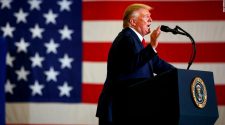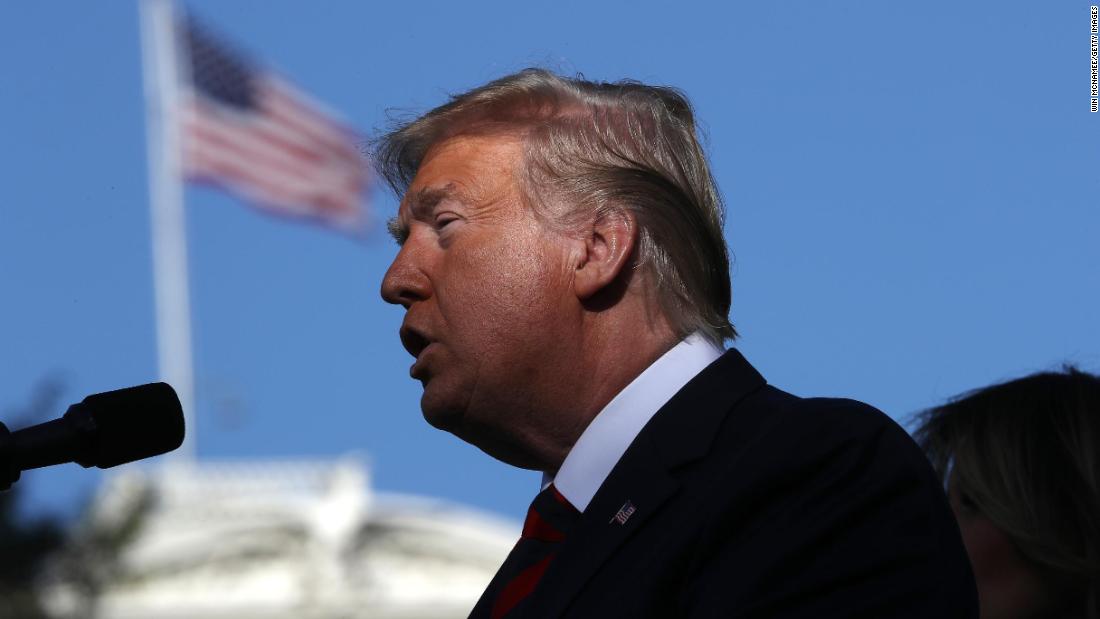Trump’s decision marks a departure for a White House that has a record of obstructing oversight and bending fact. So his critics will await events on Wednesday with particular interest.
The transcript and the congressional reaction to the whistleblower’s report could be critical in establishing the early terrain of the impeachment fight and to shaping public opinion that will ultimately dictate how it turns out.
Regardless of the outcome, Trump finds himself at the center of a rare and historic showdown as only the fourth president in US history to face the realistic threat of impeachment.
Pelosi took a huge risk by formally opening impeachment hearings, following months of reservations, apparently without knowing the contents of either document. If the information contained in both does not fully back up the seriousness of her charge that Trump committed high crimes and misdemeanors, she may be seen to have overreached.
That reality reflects the momentous gamble the Speaker is taking in using the ultimate constitutional instrument to wage a political battle that is neither clearly defined nor guaranteed to end in a way that benefits her party. If impeachment fails, she could unwittingly cause Trump to consider his unrestrained presidency that has frequently buffeted congressional norms as validated. And she could pave the way to the Democrats’ ultimate nightmare — a second Trump term.
Still there is no constitutional requirement for an impeachment inquiry to end in a full vote in the House.
So the impeachment collision will soon turn into a battle for America’s political soul: How voters react could decide who wins the White House in 2020 and set the country’s course for years to come.
But Pelosi has already argued that Trump’s public admission that he spoke to Zelensky about Biden in itself represents an abuse of power by a President seeking foreign help to win reelection.
“The actions of the Trump presidency revealed the dishonorable fact of the President’s betrayal of his oath of office, betrayal of our national security and betrayal of the integrity of our elections,” Pelosi said in a somber news conference Tuesday.
“Therefore, today, I am announcing the House of Representatives moving forward with an official impeachment inquiry.”
Trump blasted the impeachment gambit as an attempt by Democrats to ruin his big trip to the United Nations General Assembly, and decried their “breaking news Witch Hunt garbage.”
Pelosi told her troops on Tuesday they had reached a “moment of truth” — a comment that is as true for her long career as the highest ranking female official in US history, as it is for the nation. It’s unlikely both Trump and Pelosi can survive this power duel. Democrats hope that it will expose Trump as so unfit for office that it will prove fatal to his hopes of reelection.
Trump hopes to ignite a backlash against Pelosi, and to use the impeachment drama to inspire his base and more moderate, sympathetic Republicans to a massive turnout in November 2020.
Ultimately, if the fight resolves in Trump’s favor, the next election could throw up the historic anomaly of a President who was impeached yet still won a second term.
A painful national nightmare
Only two Presidents were impeached in the first 223 years of US history — Andrew Johnson and Bill Clinton.
Neither man was convicted by the Senate. Richard Nixon resigned before he was impeached, in the expectation that Congress would oust him for his Watergate crimes.
Now there is the possibility impeachment could happen twice in the last 20 years, reflecting the fractured state of a nation split down the middle that has been further polarized by Trump’s presidency.
An impeachment inquiry is the ultimate showdown between House Democrats who believe they were handed power in the midterm elections to constrain Trump, and a presidency that has repeatedly ripped democratic norms and tested the Constitution itself.
Unfolding events
At the United Nations, Trump put forward an alternative, retrospective justification for delaying aid to Ukraine ahead of his call to Zelensky on July 25.
He said he wanted to wait for European nations to contribute their fair share.
Later, the President insisted in a tweet that his decision to provide the declassified, unredacted transcript — opposed by senior aides — would show that there was no quid pro quo.
“You will see it was a very friendly and totally appropriate call. No pressure and, unlike Joe Biden and his son, NO quid pro quo! This is nothing more than a continuation of the Greatest and most Destructive Witch Hunt of all time!” Trump tweeted.
Pelosi’s strategy
In an appearance in Washington, Pelosi warned: “The President is making lawlessness a virtue in our country.”
The House speaker did not specifically commit to an impeachment inquiry in the appearance and it’s possible that the facts of the case will not merit, eventually, a full House vote on the question.
But she shifted her position as a political torrent changed the shape of the impeachment debate in Washington. A number of moderate swing-state Democrats who she had been trying to protect moved to the impeachment side of the argument.
She said that the nature of Trump’s alleged offense was clear — a factor that might have changed the political equation.
“This is the most understandable to the public. And It’s really important to know this. There is no requirement there be a quid pro quo in the conversation,” she said. “You don’t ask foreign governments to help us in our election. That’s what we try to stop with Russia. It’s wrong.”
Pelosi told her caucus that the impeachment would center around six House committees already investigating the President. It would be up to the Judiciary Committee eventually to decide whether to advance Articles of Impeachment. If the full House votes by simple majority to impeach a President his trial then takes place in the Senate.
There is so far no suggestion, however, that staunch Republican support for Trump in the GOP-controlled chamber is waning. That means the two-thirds majority that would be needed to convict the President on Articles of Impeachment and to oust him from office looks at this point unlikely to materialize.
Like Pelosi, Biden also seems to be calculating his political position. As the subject of Trump’s attacks and the Democratic front-runner, he is in a unique position in the cascading drama.
In an on-camera appearance apparently meant to project presidential gravitas and temperament, the former vice president said that if Trump failed to provide information about the case, he would leave lawmakers with no choice.
“Denying Congress the information, which it is constitutionally entitled to, and obstructing its efforts to investigate actions is not the conduct of an American president. It’s an abuse of power,” Biden said.
“Donald Trump will leave Congress, in my view, no choice but to initiate impeachment. That would be a tragedy, but a tragedy of his own making,” Biden said.
Obstacles
Impeachment — which can result in a democratic election being overturned — is the most serious and consequential political maneuver available under the Constitution. It would tear at the fabric of the nation and trigger incalculable results and political forces that could reverberate for years.
Trump made the decision to release the whistleblower complaint on Tuesday, a source familiar with the process told CNN.
Previously, the White House had pressured acting Director of National Intelligence Joseph Maguire not to give it to lawmakers, a step that Democrats say is in itself an infringement of the law.
It’s unclear what is behind his change in position, though Pelosi told lawmakers she pressed Trump during a Tuesday phone call to release the complaint.
Two White House officials downplayed expectations for any bombshell revelation in the call transcript, saying it is expected to be “underwhelming.”
One of the officials conceded that makes the release of the whistleblower complaint that much more important. But the official raised questions about the credibility of the administration employee who filed the complaint about Trump’s interactions with the Ukrainian President, referring to the employee as “the so-called whistleblower.”



















